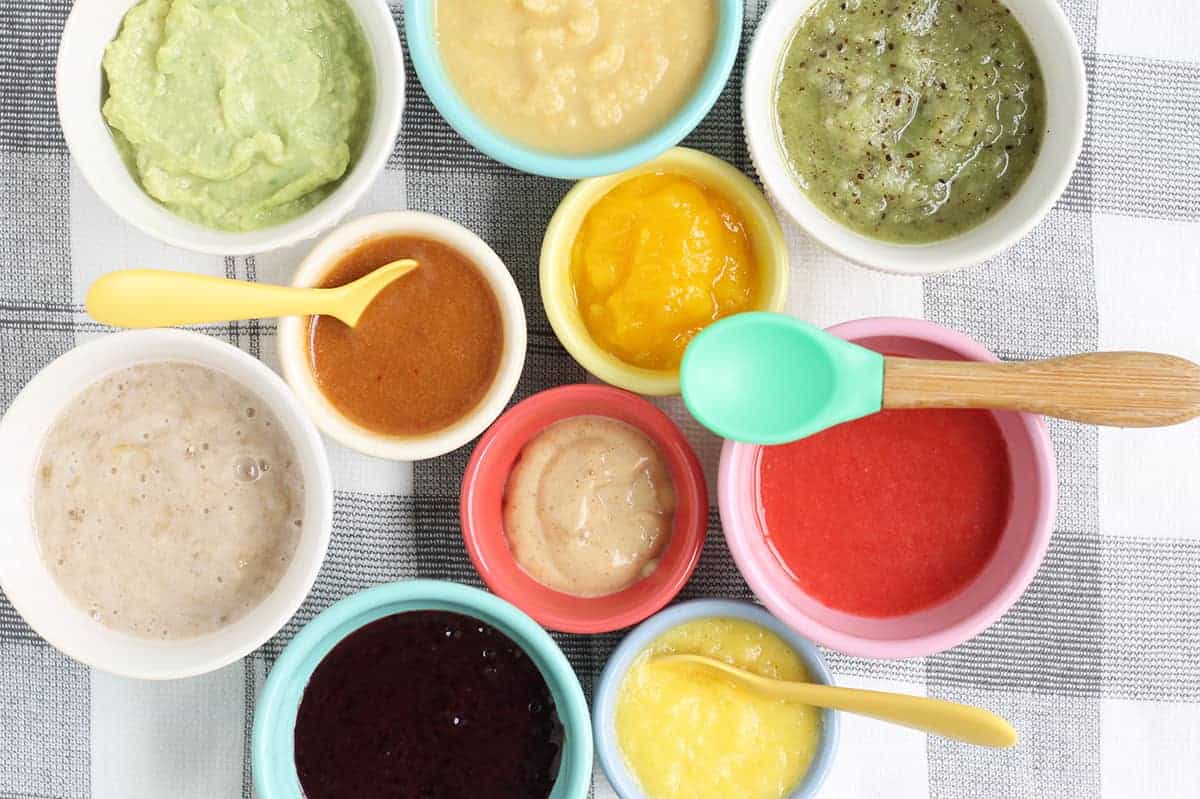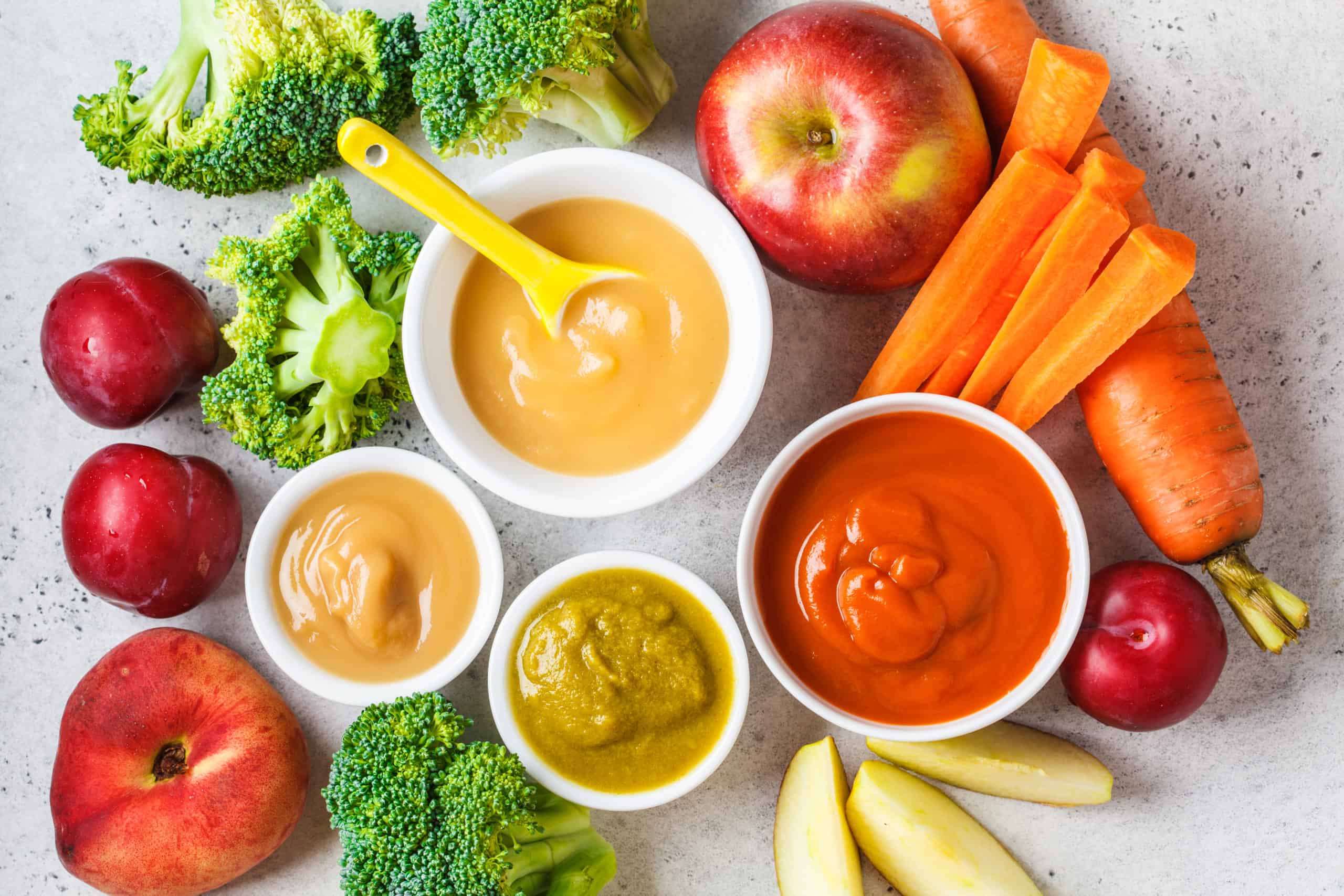As a parent, it’s natural to want the best for your little one. And when it comes to their nutrition, nothing beats homemade organic baby food. Not only is it healthier, but it’s also more affordable and allows you to control the ingredients that go into your baby’s meals. But with so many recipes out there, how do you know which ones are the best?
That’s where we come in. We’ve compiled a list of 10 of the best organic baby food recipes that are not only delicious but also packed with nutrients that your baby needs to thrive. From sweet potato puree to avocado and banana mash, these recipes are easy to make and guaranteed to satisfy your baby’s taste buds while providing them with the nutrients they need for optimal growth and development. So, roll up your sleeves, grab your blender, and let’s get cooking!
10 of the best Organic Baby Food Recipes: Making your baby’s food at home ensures that your child is getting fresh, nutritious meals. Here are ten organic baby food recipes to try: 1) Sweet Potato Puree; 2) Avocado Mash; 3) Butternut Squash Puree; 4) Apple and Pear Sauce; 5) Carrot Puree; 6) Pea Puree; 7) Spinach and Banana Puree; 8) Blueberry Puree; 9) Quinoa and Sweet Potato Puree; 10) Brown Rice Cereal. These recipes are easy to make and packed with nutrients your baby needs to grow healthy and strong.


10 of the Best Organic Baby Food Recipes
Introducing solids to your baby’s diet can be a fun and exciting adventure for both you and your little one. Making your own organic baby food is not only cost-effective, but it also ensures that your baby is eating fresh, healthy, and nutritious foods. Here are 10 of the best organic baby food recipes that are easy to make and packed with essential vitamins and minerals.
1. Sweet Potato Puree
Sweet potatoes are an excellent source of vitamin A, potassium, and fiber, making them a great choice for your baby’s first food. To make sweet potato puree, simply bake or steam sweet potatoes until soft, and then blend them in a food processor until smooth. You can also add a pinch of cinnamon for flavor. Sweet potato puree can be stored in the refrigerator for up to three days or frozen for up to three months.
- Benefits: Helps in digestion, boosts immunity, and promotes healthy skin.
- VS: Store-bought baby food is often processed and may contain additives such as sugar and preservatives.
2. Avocado Mash
Avocado is an excellent source of healthy fats, fiber, and potassium, making it a great food for your baby’s brain and heart health. To make avocado mash, simply mash a ripe avocado with a fork until smooth. You can also add a squeeze of lemon juice for flavor. Avocado mash can be stored in the refrigerator for up to two days.
- Benefits: Promotes healthy brain development, boosts immunity, and supports healthy growth and development.
- VS: Store-bought baby food may contain added sugars and preservatives.
3. Butternut Squash Puree
Butternut squash is a great source of vitamin A, vitamin C, and potassium, making it an excellent food for your baby’s overall health and development. To make butternut squash puree, simply bake or steam butternut squash until soft, and then blend it in a food processor until smooth. You can also add a pinch of cinnamon for flavor. Butternut squash puree can be stored in the refrigerator for up to three days or frozen for up to three months.
- Benefits: Supports healthy vision and skin, boosts immunity, and promotes healthy digestion.
- VS: Store-bought baby food may contain added sugars and preservatives.
4. Apple Puree
Apples are a great source of fiber, vitamin C, and antioxidants, making them a perfect food for your baby’s overall health and well-being. To make apple puree, simply peel and chop apples, and then cook them until soft. Blend the cooked apples in a food processor until smooth. You can also add a pinch of cinnamon for flavor. Apple puree can be stored in the refrigerator for up to three days or frozen for up to three months.
- Benefits: Supports healthy digestion, boosts immunity, and promotes healthy brain development.
- VS: Store-bought baby food may contain added sugars and preservatives.
5. Carrot Puree
Carrots are a great source of vitamin A, vitamin C, and fiber, making them an excellent food for your baby’s overall health and well-being. To make carrot puree, simply peel and chop carrots, and then cook them until soft. Blend the cooked carrots in a food processor until smooth. Carrot puree can be stored in the refrigerator for up to three days or frozen for up to three months.
- Benefits: Supports healthy vision and skin, boosts immunity, and promotes healthy digestion.
- VS: Store-bought baby food may contain added sugars and preservatives.
6. Banana Puree
Bananas are a great source of potassium and fiber, making them an excellent food for your baby’s overall health and well-being. To make banana puree, simply mash a ripe banana with a fork until smooth. Banana puree can be stored in the refrigerator for up to two days.
- Benefits: Supports healthy digestion, boosts immunity, and promotes healthy brain development.
- VS: Store-bought baby food may contain added sugars and preservatives.
7. Pea Puree
Peas are a great source of vitamin A, vitamin C, and protein, making them an excellent food for your baby’s overall health and development. To make pea puree, simply boil or steam peas until soft, and then blend them in a food processor until smooth. Pea puree can be stored in the refrigerator for up to three days or frozen for up to three months.
- Benefits: Supports healthy digestion, boosts immunity, and promotes healthy growth and development.
- VS: Store-bought baby food may contain added sugars and preservatives.
8. Spinach Puree
Spinach is an excellent source of iron, vitamin C, and antioxidants, making it a great food for your baby’s overall health and well-being. To make spinach puree, simply steam spinach until wilted, and then blend it in a food processor until smooth. Spinach puree can be stored in the refrigerator for up to three days or frozen for up to three months.
- Benefits: Supports healthy brain development, boosts immunity, and promotes healthy digestion.
- VS: Store-bought baby food may contain added sugars and preservatives.
9. Blueberry Puree
Blueberries are an excellent source of antioxidants and vitamin C, making them a great food for your baby’s overall health and well-being. To make blueberry puree, simply cook blueberries until soft, and then blend them in a food processor until smooth. Blueberry puree can be stored in the refrigerator for up to three days or frozen for up to three months.
- Benefits: Supports healthy brain development, boosts immunity, and promotes healthy digestion.
- VS: Store-bought baby food may contain added sugars and preservatives.
10. Quinoa and Vegetable Puree
Quinoa is an excellent source of protein, fiber, and essential amino acids, making it a great food for your baby’s overall health and development. To make quinoa and vegetable puree, simply cook quinoa and vegetables until soft, and then blend them in a food processor until smooth. Quinoa and vegetable puree can be stored in the refrigerator for up to three days or frozen for up to three months.
- Benefits: Supports healthy growth and development, boosts immunity, and promotes healthy digestion.
- VS: Store-bought baby food may contain added sugars and preservatives.
In conclusion, making organic baby food at home is not only easy and cost-effective but also ensures that your baby is eating fresh, healthy, and nutritious foods. These 10 organic baby food recipes are packed with essential vitamins and minerals that will help support your baby’s overall health and development.
Frequently Asked Questions
Here are some commonly asked questions about organic baby food recipes:
What are the benefits of making homemade organic baby food?
There are several benefits to making your own organic baby food. Firstly, you have complete control over the ingredients that go into your baby’s food, ensuring that they are getting the best and healthiest options. Additionally, homemade baby food is often less expensive than store-bought options and can be made in bulk and frozen for later use. Finally, making your own baby food can be a fun and rewarding experience, allowing you to get creative with flavors and textures that your baby will love.
What are some of the best organic baby food recipes?
There are countless organic baby food recipes out there, but some of the best options include pureed sweet potatoes, avocado and banana mash, roasted butternut squash, blueberry and pear puree, and apple and cinnamon puree. It’s important to vary your baby’s diet and introduce them to a variety of flavors and textures, so don’t be afraid to get creative in the kitchen.
How do I ensure that my homemade organic baby food is safe to eat?
It’s important to take proper safety precautions when making your own baby food. Always wash your hands and all utensils and surfaces thoroughly before preparing food. Additionally, be sure to use fresh, organic ingredients and avoid any that are spoiled or past their expiration date. When storing homemade baby food, use airtight containers and refrigerate or freeze immediately. Discard any leftover food that has been sitting out for more than an hour.
Can I add spices and herbs to my baby’s food?
Yes, you can add spices and herbs to your baby’s food, but it’s important to introduce them gradually and in small amounts to ensure that your baby isn’t allergic or sensitive to any particular ingredient. Some good options to try include cinnamon, ginger, thyme, and basil. Always opt for fresh, organic herbs and spices and avoid any blends that contain salt or sugar.
How do I know when my baby is ready for solid foods?
The American Academy of Pediatrics recommends that babies be exclusively breastfed for the first 6 months of life, and then gradually introduced to solid foods. Signs that your baby may be ready for solids include being able to sit up unsupported, showing interest in food, and being able to hold their head up and open their mouth when offered a spoon. Always consult with your pediatrician before introducing solids to your baby’s diet.


10 Best Organic Baby Foods 2020
As a professional writer, I can confidently say that introducing organic baby food into your child’s diet is an excellent choice for their physical and mental health. And what better way to do so than with homemade recipes that are both delicious and nutritious? From pureed fruits and veggies to hearty grains and proteins, the possibilities are endless.
With the 10 organic baby food recipes provided, you can rest assured that your little one is getting the best possible start in life. These recipes not only take into account your baby’s nutritional needs but also their taste preferences. So whether you’re a seasoned chef or a beginner in the kitchen, these recipes are easy to follow and customizable to suit your baby’s needs. By investing time and effort in making organic baby food, you’re not only nourishing their growing bodies but also setting them up for a lifetime of healthy eating habits.



